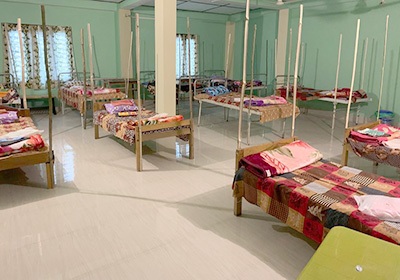
[ Tongam Rina ]
ITANAGAR, Apr 24: Arunachal, the only state in the Northeast region without a Covid-19 testing laboratory, is still putting one together.
According to the health department, the installation at Tomo Riba Institute of Health & Medical Sciences (TRIHMS) is expected to be completed in the next three days.
Once the Indian Council of Medical Research (ICMR) gives its approval, Covid-19 testing will be done at TRIHMS, Health Secretary P Parthiban said while responding to a question from this daily.
“The equipment have been brought from Hyderabad by road,” he said.
Presently, as the state does not have a testing centre, the samples collected from Arunachal are sent to the Regional Medical Research Centre in Dibrugarh, Assam – one of the six regional centres of the ICMR, which takes up to 36 hours to return a result because of heavy load.
Meanwhile, the health department here has received 3800 rapid testing kits from the ICMR. They are, however, not being used as they are only for surveillance.
The state is free of Covid-19 as of now, since the only positive patient recovered from the infection and was released on 16 April from the zonal general hospital in Tezu. But doctors working on the frontline are not happy with the arrangement made by the health department. They say the kits should be made available to all major health facilities.
One of the doctors said that at least 40,000 kits certified by the ICMR are needed in the state as it prepares for the return of the students and others from outside the state once the lockdown is lifted on 3 May.
While this daily cannot confirm the exact number of students and others from the state who are stranded in other parts of the country, the last official count listed more than 14,000 people.
While not all of them might come back, the state is still ill-equipped in terms of quarantine centres as well as facilities.
While 106 quarantine centres have been identified, the total number of beds is less than 2000, according to the health department.
How prepared are the quarantine centres?
While the district administrations across the state have identified quarantine centres, most are without basic facilities like regular water or power supply, or even adequate toilets.
The identified quarantine centres are guesthouses and educational institutions.
Most of the officials did not want to be quoted for this report, but they agreed that they are only putting together the facilities now, even though the facilities had been identified more than three weeks ago.
One of the few exceptions is a quarantine centre in Papum Pare district, which has the basic minimum facilities (see pic).
When contacted, Papum Pare District Medical Officer, Dr Tasso Kampo Subu, said that her department is making every effort to provide all facilities to those who are housed in the quarantine centre.
The facility currently houses 13 people.
PTC quarantine centre for 400 without basic facilities
In the Papum Pare/Itanagar capital region, the police training centre (PTC) in Banderdewa has been identified as a quarantine centre. The intake capacity is for 400 persons. Tents will also be pitched there. The centre still lacks water and toilet facilities.
“We are preparing the facility and it will be ready soon with water and toilet facilities,” said an official.
Two kiosks for swab collection are also being installed, officials said.
While the Hollongi check gate will be open for transportation of basic facilities, it will be closed to travellers, said an official.
The Banderdewa check gate will be the main point of entry, and whoever enters will have to stay at the PTC quarantine centre for 14 days.
Meanwhile, Health Director, Dr M Lego, said that the state is preparing for the return of the students once the lockdown is lifted.
“Everybody has to be in quarantine centres for 14 days once they come home, because the home quarantine protocol is not followed,” he said.
Responding to a question on testing, he said clinical assessment will be done at the entry point. “Those with symptoms will be sent to TRIHMS,” Dr Lego said.
Doctors on the frontline in Arunachal insist that more tests should be carried out, as many positive patients are asymptomatic. They cite the example of the Tezu patient, who had not shown any symptom, even though he had the virus.
The doctors say that thermal testing is farcical – a tool to fool not only the people but also the health department itself. Further, many of the health officials are still without required personal protection equipment.
They are also questioning the rigidity of the testing protocol, as not many with the virus show symptoms. More tests have to be done, the doctors say.
The state has so far successfully managed with preventive measures, including lockdown and testing of those with severe symptoms and those who had travelled to one of the hotspots of Covid-19 (including the one who had tested positive) and their contacts.
“We should be testing each and every returnee since many positive patients are asymptomatic. Thermal scanner is a farce,” one of the doctors said.
The mystery of RTK board
Meanwhile, the health department was not able to specify the outcome of the board that had been constituted to examine the feasibility of adopting the rapid testing kits (RTK) approved by the ICMR for use in management of Covid-19 in Arunachal.
“The feasibility of adopting the cartridge-based nucleic acid amplification test for diagnosing the disease will also be examined simultaneously by the board. The kit is manufactured by Sensing Self Pvt Ltd, Singapore. It is distributed by Global Hospitality Pvt Ltd, and registered with the FDA,” an official statement from the health department released on 6 April read.
The health officials, including the health secretary, said that they had no idea about the board, while Health Minister Alo Libang, who has been mostly missing from the scene, did not respond to messages and calls from this reporter.


